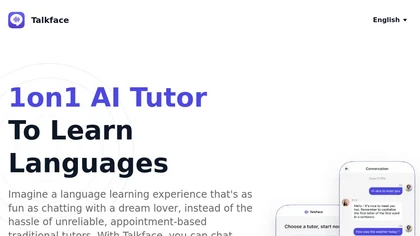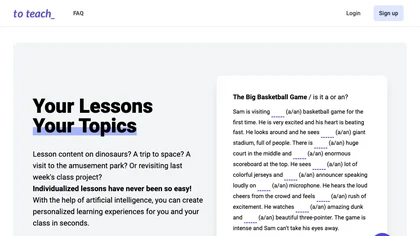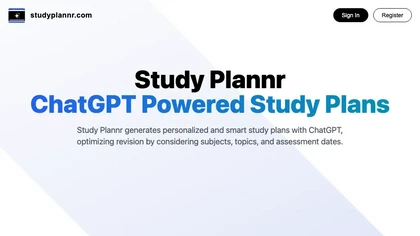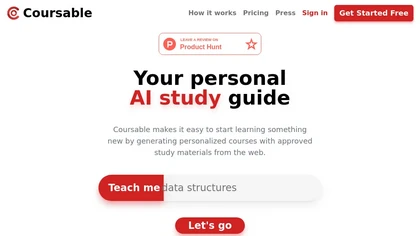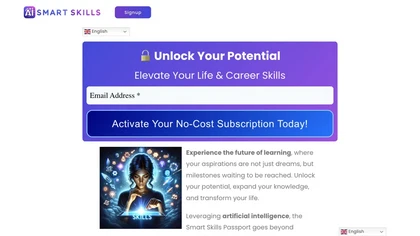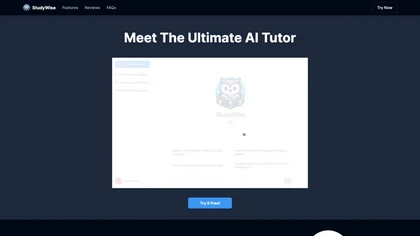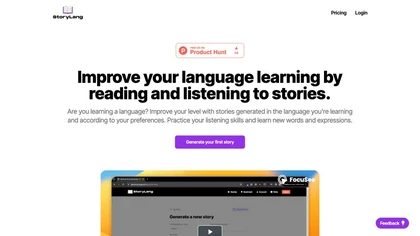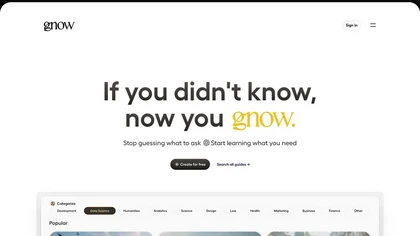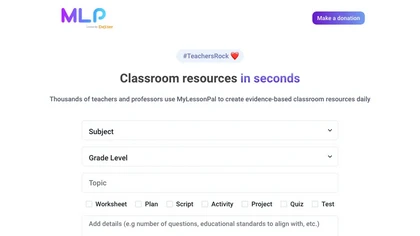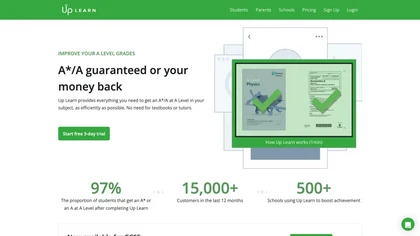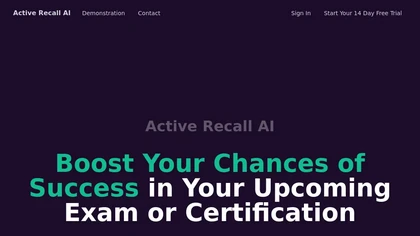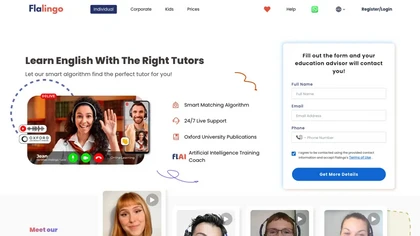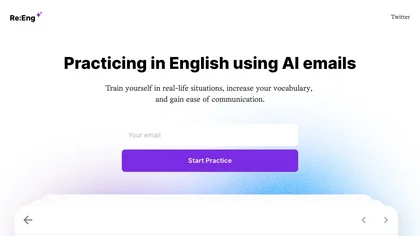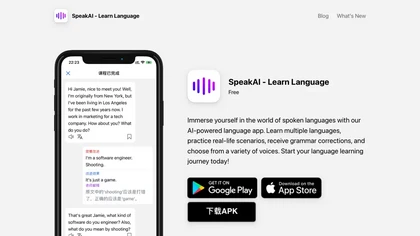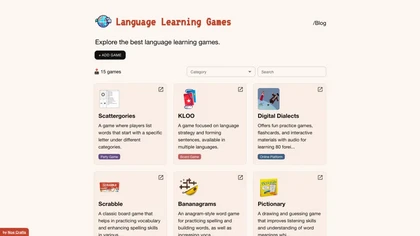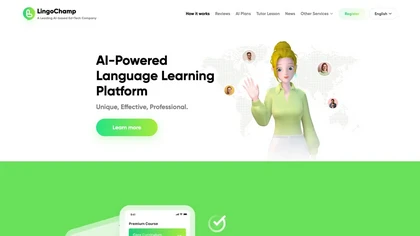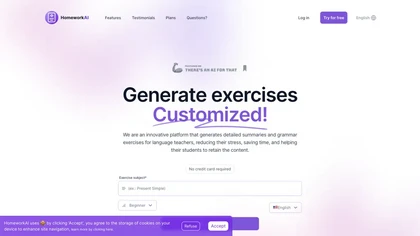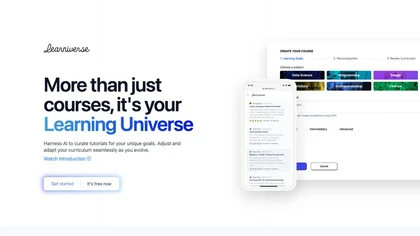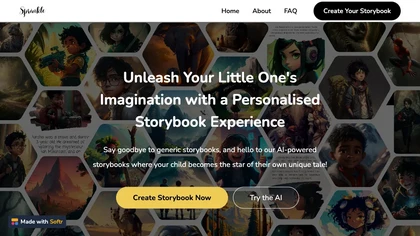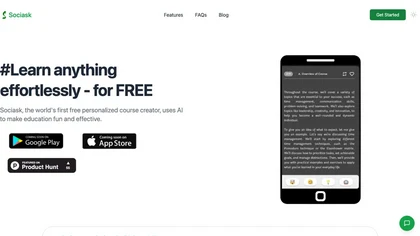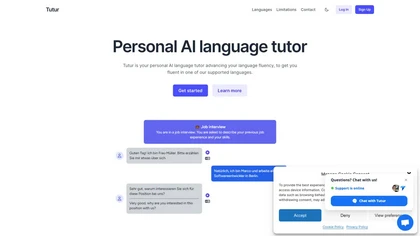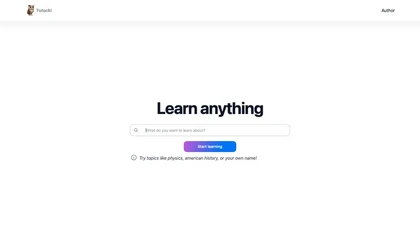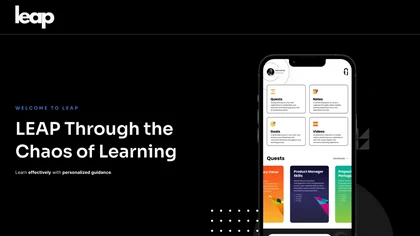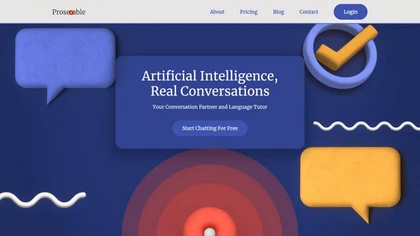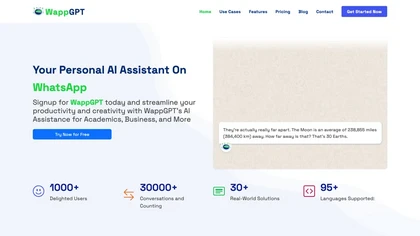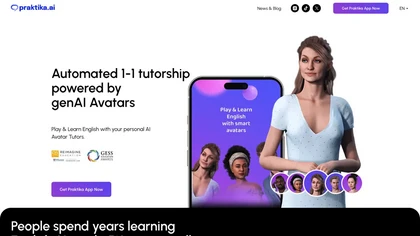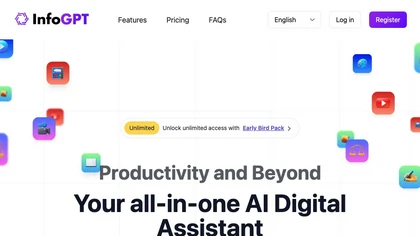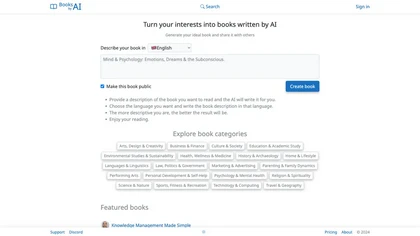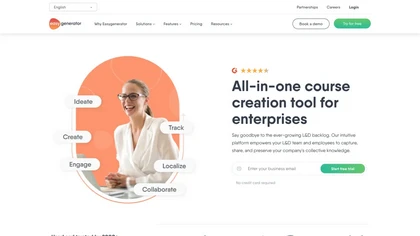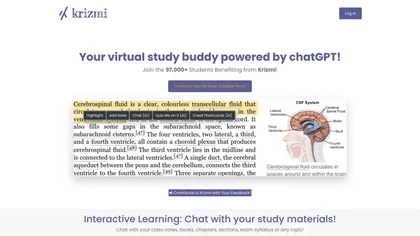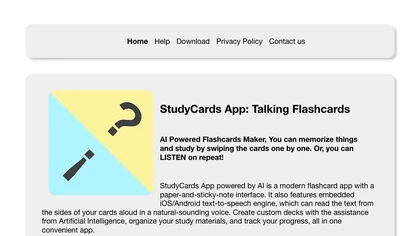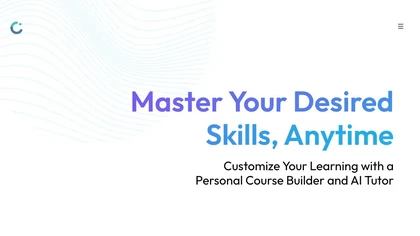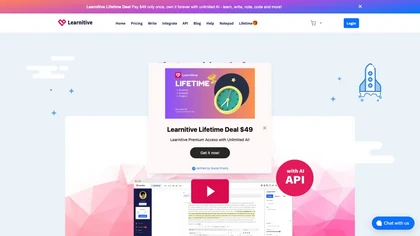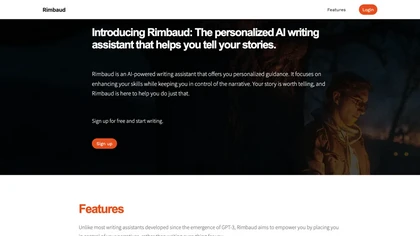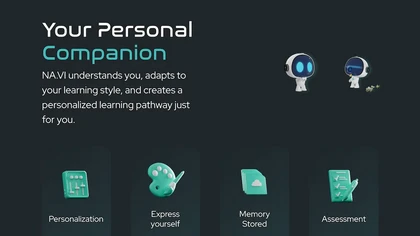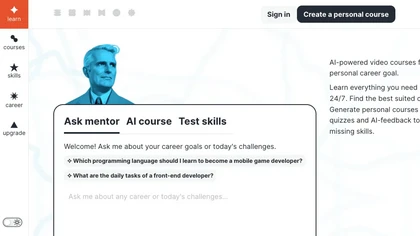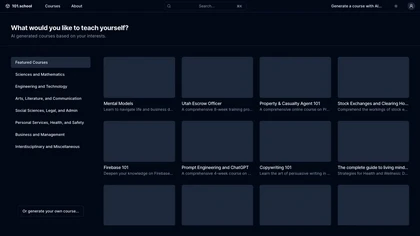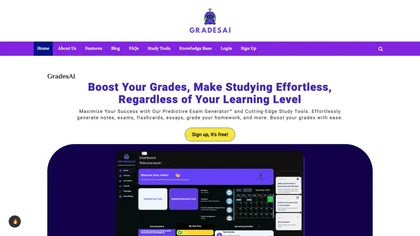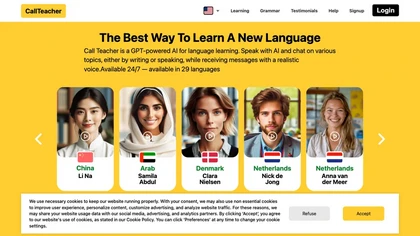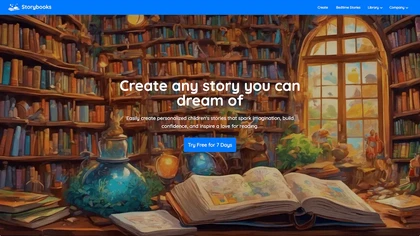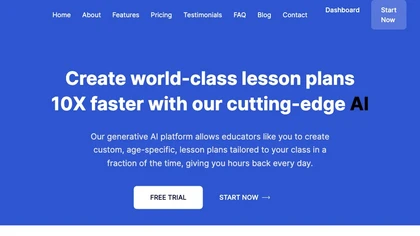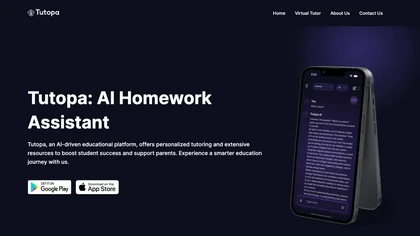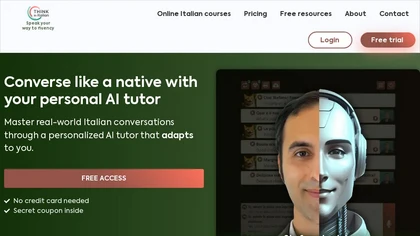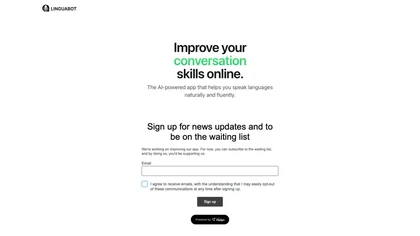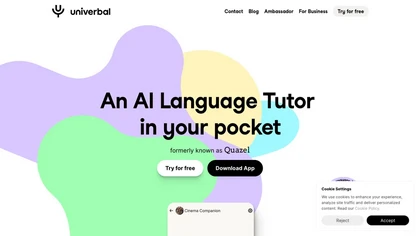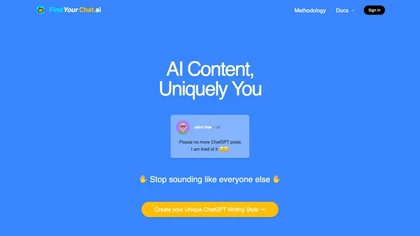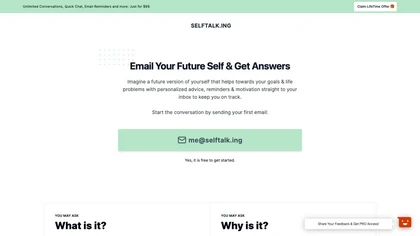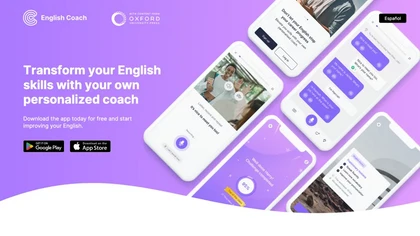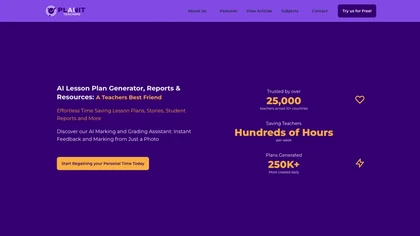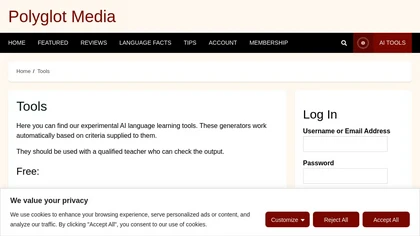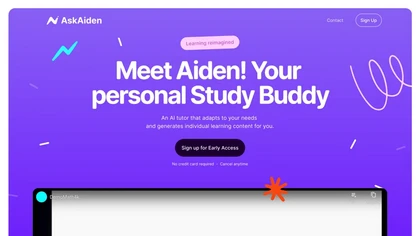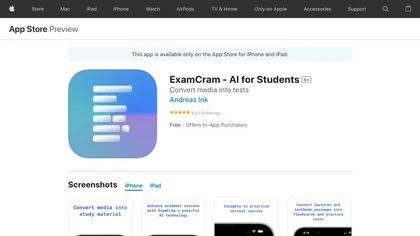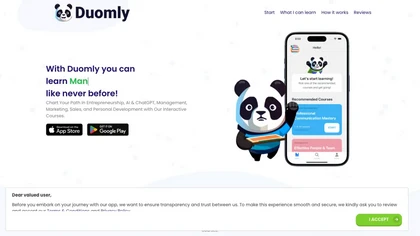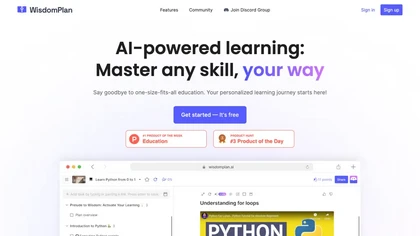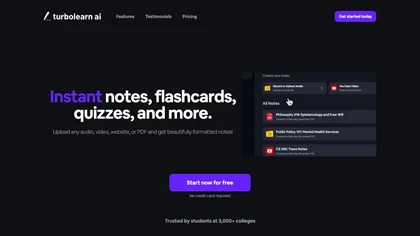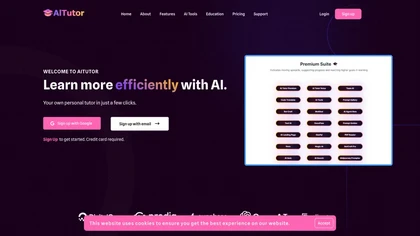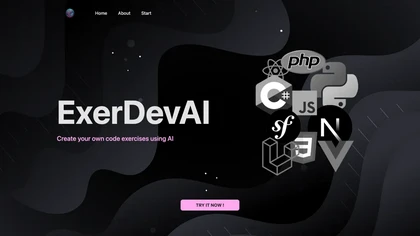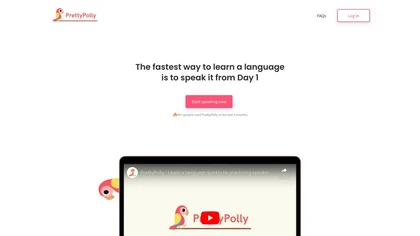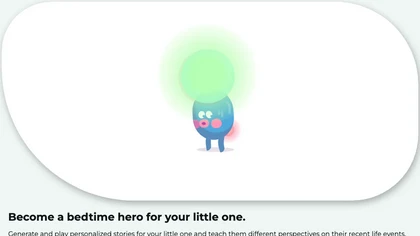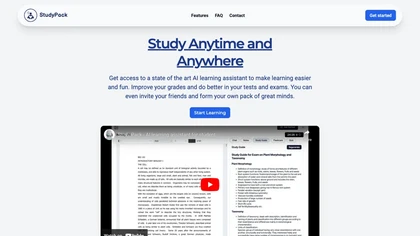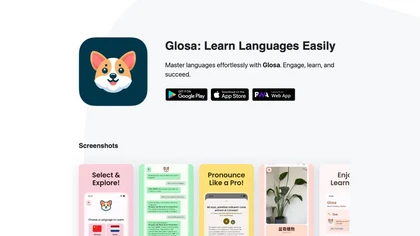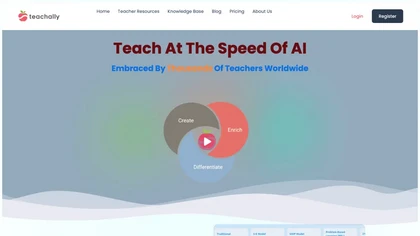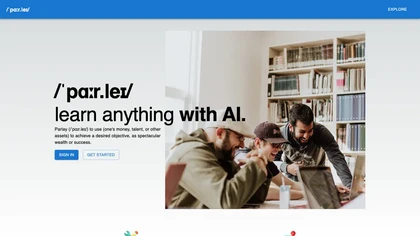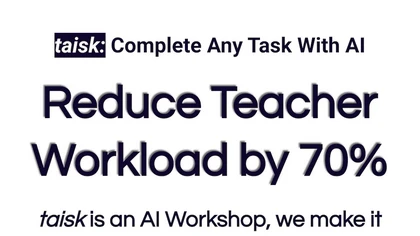AI use cases for Learning
Generative AI can be applied in various applications for learning. Here are some examples to explore below for inspiration with AI tools to get you started with using AI in learning.
🛠️ 70 AI tools for Learning
Explore a dynamic list of some of the most popular tools to get you started with various AI use cases and applications for Learning to streamline your workflows and productivity today.
Talkface features
- 1-on-1 tutoring
- Personalized curriculum
- Language learning
- Fun and engaging
- Affordable solutions
- Eliminates need for unreliable tutors
- Available on android and ios devices
To Teach features
- Create personalized exercises
- Create lesson plans
- Tailor teaching materials to students' interests
- Offer free and paid plans
- Work alongside human teachers
StudyPlannr features
- Generate personalized study plans
- Consider subjects, topics, and assessment dates
- Self-regulate and improve revision efficiency
- Download as pdf or print for easy reference
- Support students in goal setting and cultivating good study habits
Language Atlas features
- adaptive lessons
- flashcard usage
- speaking practice
- audio and video examples
- global community
Coursable.io features
- Generate personalized courses
- Adjust course based on subject needs
- Evaluate quality of online materials
- Provide optimal course for learning
- Customize courses
- Act as education booster
- Curate courses
- Adapt to individual preferences
- Learn at own pace
- Track progress
SmartLifeSkills
4.8SmartLifeSkills features
- Interactive platform with AI chatbots
- Multilingual lessons with authentic accents
- Adjustable playback speed
- Advanced text-to-speech technology
- Custom quiz generator
StudyWise features
- Transforms study sessions into interactive dialogues
- Personalized study assistance based on learning style and pace
- Interactive quizzing for better knowledge retention
- Ability to import study materials from various sources
- Available 24/7 as an AI study partner
🔥
Create your account, save tools & get personal recommendations
Receive a weekly digest of our handpicked top tools.
Unsubscribe anytime
StoryLang features
- Customizable story generation
- Text and audio output
- Vocabulary expansion
- Personalized enhancements using OpenAI API
- Credit-based story generation
gnow features
- Personalized learning tool
- Structured and comprehensive content
- Interactive tools (quizzes, flashcards)
- AI integration for abstract idea visualization
- Community-driven guides
MyLessonPal features
- Generate worksheets
- Create lesson plans
- Develop scripts
- Design activities
- Craft quizzes
- Create tests
Up Learn features
- AI-powered educational tool
- World-class learning content
- Interactive videos
- Detailed progress tracking
- AI-powered diagnostic algorithm
Active Recall features
- Automatically generated quizzes
- Writing assignments from uploaded study material
- Multiple-choice questions based on text
- Essay questions based on practical medical scenarios
- Tailored question bank reflecting certification structure
flAI features
- Personalized learning experience
- Feedback on vocabulary, grammar, and homework assignments
- Effective learning method suggestions
- English proficiency level monitoring
- Access to Oxford University Press publications
Re:Eng features
- Email practice
- Vocabulary building
- Real-life situation practice
- Progress tracking
- Language barrier breaking
SpeakAI.cc features
- AI-powered language learning app
- Personalized learning paths and interactive exercises
- Support for a wide range of languages
- Real-time feedback and personalized grammar suggestions
- Real-time dialogue feature for practicing with virtual partners and native speakers
Language Learning Games features
- Wide range of language learning games
- 15 different game categories
- Interactive audio materials
- Variety of fun language learning games
- Engaging mini-games
lingoXpress features
- Comprehensive language learning tool
- Accessible on Kindle and smartphones
- Wide array of resources including books, audio content, daily word features
- AI tutor for personalized learning
- Support for over 65 languages, including constructed languages like Klingon and Dothraki
LingoChamp features
- Personalized courses
- Support for six languages
- Specialized Business English courses
- Simulated and real-life conversations
- Interactive chat community
HomeworkAI features
- Generates customized grammar exercises
- Provides detailed summaries
- Generates interactive stories
- Allows for content editing and customization
- Offers a free trial
Learniverse features
- Curates tutorials based on unique learning goals
- Seamlessly adjusts and adapts curriculum as user progresses
- Mobile-friendly UI
- Personalized pathways tailored to ambitions
- Provides trustworthy collection of educational resources
Teacher AI features
- Personalized speaking practice
- Unlimited conversation practice
- Tailored conversations on topics of interest
- Error corrections and grammar explanations
- Progress tracking
Sprinkle features
- Story generation
- Personalization
- Unique tales
- Adventure
- Ai technology
Sociask features
- Personalized course creation
- Tailored learning experiences
- Adaptive learning approach
- Use of intuitive examples and analogies
- Utilization of AI for enhanced comprehension
Tutur features
- Detailed insight into fluency progress
- Multiple practice scenarios
- User-friendly interface
- Speech analysis
- Progress tracking
Whiteboard features
- Generates interactive summaries
- Allows users to ask questions
- Supports note-taking and bookmarking important ideas
- Provides features for creating and sharing flashcards
- Integrated work with other platforms such as canvas, zoom, and youtube
TutorAI features
- Learning
- Customization
- Tracking
- Interactive
- Quizzes
Leap Learning features
- Personalized guidance
- Comprehensive collection of video-based text-based formats
- Flexible content types for different learning preferences
- Subscription service with beta testing phase
- Focus on utility in various subjects like business strategy, management, finance, data science
ProseAble features
- Real-time conversations
- Grammatical corrections suggestions
- Support for multiple languages (English, French, Spanish, Italian, German)
- Tailored practice conversations for IELTS exam preparation
- Language proficiency improvement
WappGpt features
- Variety of assistance areas
- Idea generation support
- Project planning assistance
- Studying support
- Natural language processing capabilities
Praktika.ai features
- Generative AI avatar tutors
- Personalized 1-1 tutorship
- Real-time session feedback
- 1000+ lessons
- Unlimited learning opportunities
Beeyond AI features
- Voice-to-text conversion
- Art studio functionality
- Pdf document chatbot
- Social media optimization
- Travel planning assistance
- Nutritional recipe creation
- Book and movie research
- Productivity tools
- Legal assistance
- Multilingual support
- Organization and content categorization
- Up-to-date information access
Books by AI features
- Book generation
- Tailored descriptions based on user interests
- Language selection for enhanced results
- Covering a wide range of book categories
- Support for both personal and academic purposes
EasyAI features
- Consent management
- Cookie utilization
- Auto-translation into 75 languages
- Text-to-speech capabilities
- Importing PowerPoint presentations
Stadai features
- Interactive chat functionality
- Auto-generation of flashcards
- Personalized study materials
- Customized quizzes
- Comprehensive progress tracking
StudyCards App features
- Flashcard maker
- Text-to-speech
- Custom deck creation
- Eyes-free mode
- Sharing
- Exporting
- Importing
Chat2course features
- Customizable learning
- Personal course builder
- Ai tutor
- Ai-curated course selections
- Human collaboration features
Learnitive features
- AI writer for generating unique copyscaped content
- Note-taking app for organizing projects efficiently
- AI prompts for tuning output
- Search through millions of academic papers and Wikipedia for references
- AI-assisted interactive workspaces for auto-generating codes, illustrations, and contents
Rimbaud AI features
- Personalized AI writing assistant
- Focus on enhancing writing skills
- Tailored learning experiences
- AI-generated writing prompts based on preferences
- Advanced editing system for grammar, style, and voice preservation
NA.VI features
- Personalized learning pathways
- Adaptive to unique learning styles
- Interactive features
- Assessment tools exploration
- Data privacy prioritization
Unschooler features
- Career guidance
- Personalized courses
- Video courses
- Quizzes
- Ai feedback
101.school features
- Course recommendation generation
- Innovative course search feature
- AI technology utilization
- Wide range of course topics
- Diverse subject coverage
Promptly features
- Generate prompts
- Provide predefined prompts
- Assist with ai writing software
GradesAI features
- Predictive Exam Generator™ (PEG)
- User-Friendly Dashboard and Interface
- Flashcard Generator using GSAI Algorithm
- Summaries and Study Guides
- Text Crafting and Essay Writing
Callteacher features
- Real-time interaction for practicing speaking, listening, reading, and writing skills
- Personalized courses tailored to individual progress and interests
- Engage in one-on-one conversations with AI teachers
- Multilingual support for 29 languages
- 24/7 service availability and progress tracking
StoryBooks features
- Customize characters
- Tailor story to preferences
- Create personalized experience
- Support story generation in multiple languages
- Promote linguistic inclusivity
AI Lesson Plan features
- Lesson plan creation
- Customization
- Resource generation
- Price plans
- Subject, grade-level, and textbook tailoring
Tutopa features
- Personalized tutoring
- Extensive educational resources
- Instant feedback feature
- Coverage of all grades
- User-friendly app interface
Think In Italian
4.9Think In Italian features
- speech recognition
- synthesis
- personalized lessons
- instant feedback
- bilingual transcripts
Linguabot features
- Language practice through interactive conversations
- Real-time pronunciation feedback
- Grammar practice support
- Vocabulary practice functionality
- Enhanced language proficiency focus
Univerbal (formerly Quazel) features
- Supports 22 languages
- Real-world quest scenarios
- Customizable topics for language quests
- Instant feedback on grammar, vocabulary, and speaking practice
- Interaction with AI-generated people and situations
FindYourChat features
- Customized writing styles
- Quiz-based prompts
- Tailoring writing style to desired tone
- Quick and effective tool
- Creating diverse chat content
Selftalk.ing
4.9Selftalk.ing features
- Unlimited conversations with future self
- Quick chat interface
- Email reminders
- Personalized advice and motivation
- Access to past conversations
English Coach AI features
- Personalized English language coaching
- Real-time feedback and corrections
- Content designed by Oxford University Press
- Mobile app availability
- Support for various work situations
Planit Teachers features
- Lesson plans generation
- Student report generation
- AI marking assistance
- Resource library across subjects and age groups
- Automated grading process
Polyglot Media features
- Vocabulary lesson generator
- Vocabulary list generator
- Grammar lesson generator
- Reading exercise generator
Ask Aiden AI features
- Adapts to student's needs
- Generates custom learning content
- Provides personalized lessons and quizzes
- Offers real-time insights and analysis
- Includes tools like quizzes, notes functions, and simulations
ExamCram features
- Study recommendations
- Flashcards
- Practice tests
Duomly features
- Interactive courses in entrepreneurship, AI, management, marketing, sales, and personal development
- Bite-sized lessons and engaging quizzes
- Hands-on experience and progress tracking
- Learning about AI, coding, and mastering new tech trends
- Interactive micro-lessons
WisdomPlan features
- Personalized learning journeys
- Intelligent planning capabilities
- Centralized management of courses, documents, and webpages
- Task organization and progress tracking
- Community interaction for sharing plans and experiences
TurboLearn features
- Generate notes, flashcards, and quizzes from various content types
- Support for uploading audio, video, websites, and PDFs
- Automatically format notes based on uploaded content
- Tailor flashcards to individual learning styles
- Transform academic articles into bite-sized materials
AI Tutor features
- Personalized education
- AI models for teaching
- Assistance with assignments
- Support for multiple languages
- Voice-activated features
ExerDevAI features
- Customized code exercise generation
- OpenAI API integration
- Variability in exercise parameters (duration, difficulty, programming languages, expertise levels)
- GPT model support (GPT-3 Turbo, GPT-4 Turbo)
- Multiple login options (Discord, GitHub, GitLab, Google)
PrettyPolly features
- Practice speaking with AI for language learning
- Fluency score based on unique words and speaking rate
- Custom scenarios for pronunciation and fluency practice
- Personalized feedback for improvement
- Daily reminders and spaced repetition flashcards integration
Rory features
- Generate
- Personalized
- Bedtime
- Stories
Study Pack features
- Chat assistant for natural text-based conversations
- Create comprehensive study guides
- Master new topics with interactive flashcards
- Test knowledge with quizzes covering various subjects
- Simplify note-taking by generating concise summaries
Glosa features
- Personalized learning experience
- Adapts to user style, pace, and preferences
- Mobile-optimized platform
- Track progress visually
- Extensive selection of languages
Teachally features
- Personalized lesson plan creation
- Alignment with over 400,000 educational standards
- Enrichments tailored to each student's needs
- Instant translations in over 100 languages
- Dynamic assignment assessment and customization
Parlay features
- Customized learning paths creation
- Progress tracking features
- Limitless customization options for learning styles
- Learning convenience with anytime, anywhere access
- Free access option
Interactive Tutor features
- AI bot creation and customization
- Integration with popular platforms (Wonde, Teams, Google)
- Access to GPT-3.5, GPT-4.5 Turbo, Dall-E, and AI Bot Library
